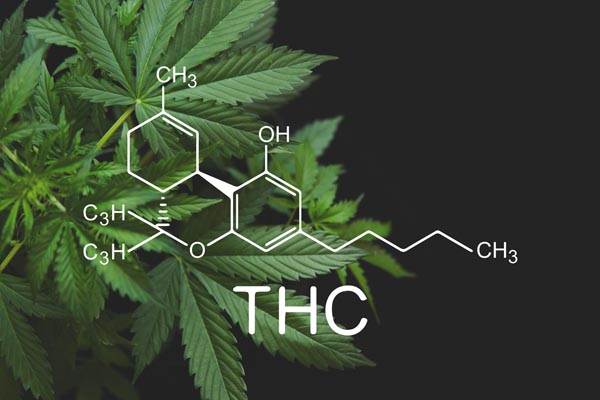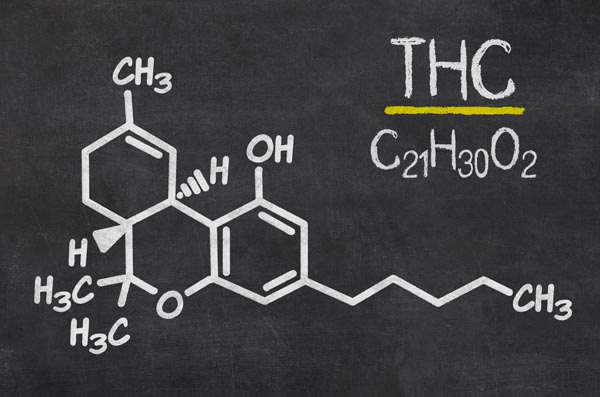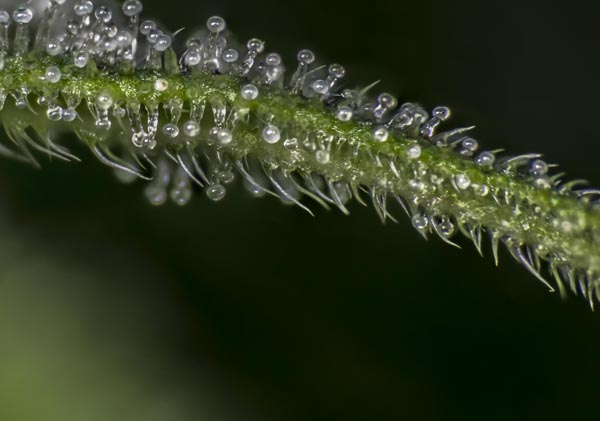What is THC?
THC is short for Tetrahydrocannabinol and it is the most abundant cannabinoid in most modern cannabis strains. It is also the primary psychoactive cannabinoid contained in cannabis.
THC is the cannabinoid most responsible for the “high” associated with cannabis.
Of the nearly 150 different cannabinoids that we currently know of, none are discussed more often than THC.
Thanks to modern research and medical cannabis legalization in some areas of the world, we now know more about what THC is, how it works, and the promising medical benefits it can offer.
While we have more information available on THC than any other cannabinoid, there is still a massive education gap surrounding the overall knowledge of its medicinal effects. We must learn more about THC and how it operates, both with other cannabinoids as well as the human body itself, so we can understand and utilize it more effectively.
The Science of THC

THC actually begins its journey as an acid compound that is most prevalently found in the flowers of female cannabis plants. This acid is known as THCA and is non-intoxicating.
Yes, you read that correctly!
The form of THC contained in fresh raw cannabis plants has little, if any, psychoactive effects.
While mainstream media and culture often show someone eating a bag of cannabis flowers and depicting them as having the most intense and worst high of all time, the truth is that eating raw cannabis flowers has almost no psychoactive effect on the human mind whatsoever.
Yes, it may cause a stomachache, but if your goal is to get “high” from eating raw cannabis flower, you’re most likely going to be very disappointed.
This is because in order for raw cannabis flowers to cause any kind of psychoactive effects, the flower must first go through a process known as “decarboxylation.”
Decarboxylation converts THCA to THC through the application of heat. This process results in creating a form of the THC chemical that your body can utilize through the CB1 and CB2 receptors found in your endocannabinoid system.
For more information on this process, please read our article on the endocannabinoid system.
What THC Is Not
For many years, people believed that THC had no medical applications and was only used for recreational purposes. Now, we understand that THC does have significant medical benefits and helps with a myriad of health problems. With the trend of medicinal cannabis becoming legal in more and more countries globally, current scientific research is leading to countless new discoveries about the medicinal properties of THC.
What are the Medicinal Properties of THC?
 THC has been shown to have the following medical properties:
THC has been shown to have the following medical properties:
- Tranquilizing / Sedating - Helps with insomnia and restlessness. THC has also been shown to help reduce nightmares for people suffering from PTSD but further studies are needed.
- Antispasmodic - Suppresses muscle spasms and tremors, especially when combined with CBD.
- Reduces Intraocular Pressure (IOP) - THC has been shown to reduce IOP for people suffering from glaucoma.
- Analgesic - THC has been shown to be effective at alleviating multiple forms of pain and is especially effective for treating neurological (nerve related) pain.
- Antiemetic - Reduces vomiting and nausea.
It’s important to remember that research and studies on THC have been extremely limited due the illegal status of cannabis throughout the world during the past century. We are excited to share more studies and information about the medicinal properties of THC as the prohibition of THC and cannabis continues to cease around the globe.
Also remember, THC is just one of more than 150 cannabinoids in the cannabis plant.
Does THC Have Any Medical Benefits?

Contrary to popular media-reports and scientific dogma, the psychoactive chemical, tetrahydrocannabinol or “THC,” showed the strongest correlation with therapeutic relief and far less evidence for the benefits of relying on the more socially acceptable chemical, cannabidiol or “CBD.”
- University of New Mexico Newsroom report on THC research study
As mentioned briefly above, many people have wrongly believed that THC offers no medicinal benefits whatsoever. This popular misconception has remained ingrained within our modern culture for many years and is now starting to unravel thanks to modern science and the cannabis community.
Ancient teachings of cannabis based healing and medicine have largely been ignored and forgotten.
Now, with medical research and development, modern science is showing that THC has the potential for treating the symptoms of a variety of ailments which include:
- Anxiety
- Glaucoma
- Insomnia
- Appetite Stimulation
- Muscle Spasticity
- Nausea
- Pain
- Breast Cancer
- Prostate Cancer
- Lung Cancer
- Lymphoma
- Glioma
Despite all of the potential medical benefits of THC, it may leave you wondering why society in general is so against this one particular cannabinoid. The psychoactive qualities of THC are primarily why cannabis is viewed as a “dangerous” drug and remains illegal in most countries around the globe. Since so many other cannabinoids have been found that offer medicinal benefits without getting patients “high,” it is often easier for society to accept the medical efficacy of these specific compounds while ignoring the obvious medical benefits of THC.
When you look at the evidence surrounding the “Entourage Effect,” it illustrates how cannabinoids interact with each other and increase the overall medicinal benefits and you can see that THC does have significant relevance when it comes to treating a variety of ailments and symptoms. To learn more about the Entourage Effect, we invite you to read our in-depth article on The Entourage Effect.
The Future of THC

Cannabis and cannabinoid research has come a long way in recent years, despite the social stigma that can often surround the topic of THC.
More research like this study that demonstrates THC’s role in helping to slow down the growth of breast cancer tumors is needed before society at large can begin to understand more of the potential medical benefits this cannabinoid has to offer.
When it comes to your individual health and medical needs it is important to remember that, like many other cannabinoids, THC does have promising medical applications that could significantly help you on your journey to overall better health.
We Want to Hear From You
Stay tuned here at Kanteeva and be certain to join the community for more information on THC and cannabis research as it becomes available.
If you have any questions about THC or any other cannabinoid, please leave them below and be sure to check out some of our other articles on cannabinoids.
Learn. Share. Connect.